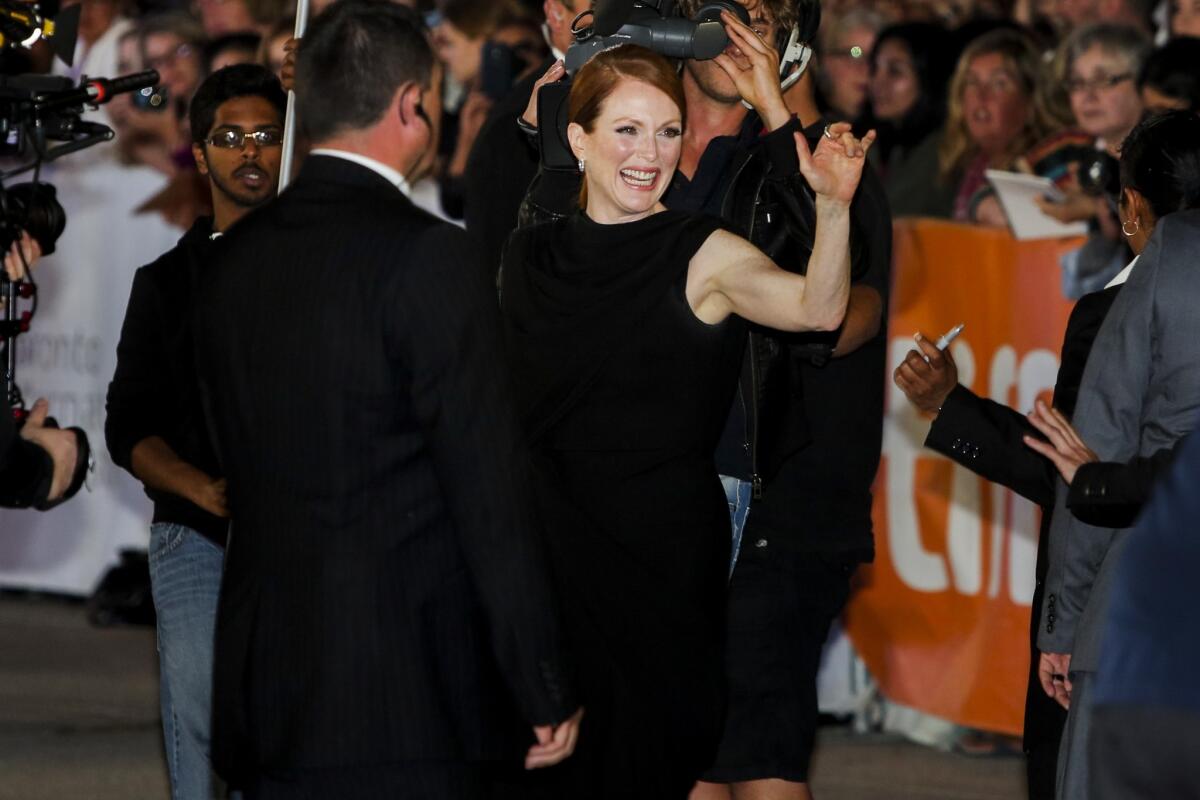Oscars 2015: A sudden surge for Julianne Moore and ‘Still Alice’

Pundits like to compare the Toronto International Film Festival and the awards season it kicks off to a modern presidential primary. We know the big names coming in--they have, after all, in a sense declared their candidacies months before-- so the festival serves mainly to separate contenders from pretenders in this pre-selected field.
Every once in a while, though, a candidate lands from out of nowhere, jolting the race and seizing momentum like Bill Clinton at a 1992 straw poll. That pretty much the dynamic of Julianne Moore and “Still Alice,” the Alzheimer’s drama that premiered at Toronto last week.
Directed by the indie helmers Richard Glatzer and Wash Westmoreland (and inspired in part by the former’s own battle with ALS), the film centers on Moore, an accomplished professor of 50 who early in the film experiences troubling neurological symptoms. Soon her doctor has diagnosed her with early-onset Alzheimer’s, and the drama that unfolds involves her struggling to preserve--in both excruciating and poignant detail--as much of her go-getter life as she can, for as long as she can.
Most striking about the film is Moore’s performance, which hits emotional notes effortlessly and captures the feeling of a person losing her faculties without any of the broad or easy signposts of such on-screen declines. We’ve seen Moore dazzle in rich roles before—as a troubled porn star in “Boogie Nights,” as a glued-tight housewife in “Far From Heaven,” as a coming-undone Sarah Palin in “Game Change,” to name three—but this adds yet another layer, requiring a seemingly impossible mix of frailty and brio.
But the role is also notable for how it was revealed to tastemakers: as an utter surprise. Coming into Toronto we pretty much knew about the big candidates--Reese Witherspoon in “Wild,” as a down-on-her-luck woman embarking on a Thoreau-ian quest up the Pacific Coast Trail, or Felicity Jones in “The Theory of Everything,” playing Stephen Hawking’s first wife, Joan, in a turn both steely and vulnerable. Moore was a wild card, mostly because her movie was a wild card. Financed independently, the film didn’t even have distribution coming into the festival.
That changed shortly after the screening, when Sony Pictures Classics snapped up rights with an eye toward dropping the film, and Moore, right into the 2014 campaign. (Incidentally, the film also features a strong supporting turn for Kristen Stewart, playing Moore’s daugther; don’t be surprised if she garners some attention too.)
There is a playbook for this sort of gambit. Every few years a drama comes into Toronto without distribution but, powered by a strong actress turn, leads to an acquisition and a kind of insta-candidacy. It happened to Julie Christie in “Away From Her” at the ’06 festival, and Nicole Kidman in “Rabbit Hole” back in 2010 (a quadrennial thing, it turns out; maybe the election metaphor is truer than we know). Both actresses wound up being nominated for an Oscar.
It’s almost a certainty at this point Moore will follow suit. Can she go all the way and win? There are plenty of reasons to think so. Her performance offers the hook of a big transformation plainly visible over the course of a film—always catnip to voters—but also, in its understatement, comes with a subtlety that will rally critics to its side as well.
There’s an equally seductive narrative off-screen. Unlike Witherspoon, who has won an Oscar before (in 2006 for “Walk The Line”), Moore never has taken the podium, despite four nominations. The always-a-bridesmaid narrative plays well in Oscar-land, and Moore frequently tops the list of those who don the dress but end up catching the bouquet. This especially hit home in 2003, when she was nominated twice—for her lead turn in “Heaven” and supporting role in “The Hours”--and came away empty-handed.
There are other contenders still to premiere—Amy Adams in “Big Eyes” and Rosamund Pike in “Gone Girl”—not to mention some more commercial-skewing plays that could make the Oscar grade (Meryl Streep in “Into the Woods” and even Shailene Woodley for this summer’s “The Fault in Our Stars”). And there are people with the power to unseat Moore-- the Witherspoon renaissance, quippily dubbed the Reesurgence, offers its own appeal. It’s far too early to count anyone out.
Yet the performance and backstory combination Moore offers isn’t easy to match. For all the reliability of the Oscar race, surprises, as with politics, can come. And when they do, they come with a ferocity. Sometimes it doesn’t take much to go from unknown to immovable.
More to Read
Only good movies
Get the Indie Focus newsletter, Mark Olsen's weekly guide to the world of cinema.
You may occasionally receive promotional content from the Los Angeles Times.







